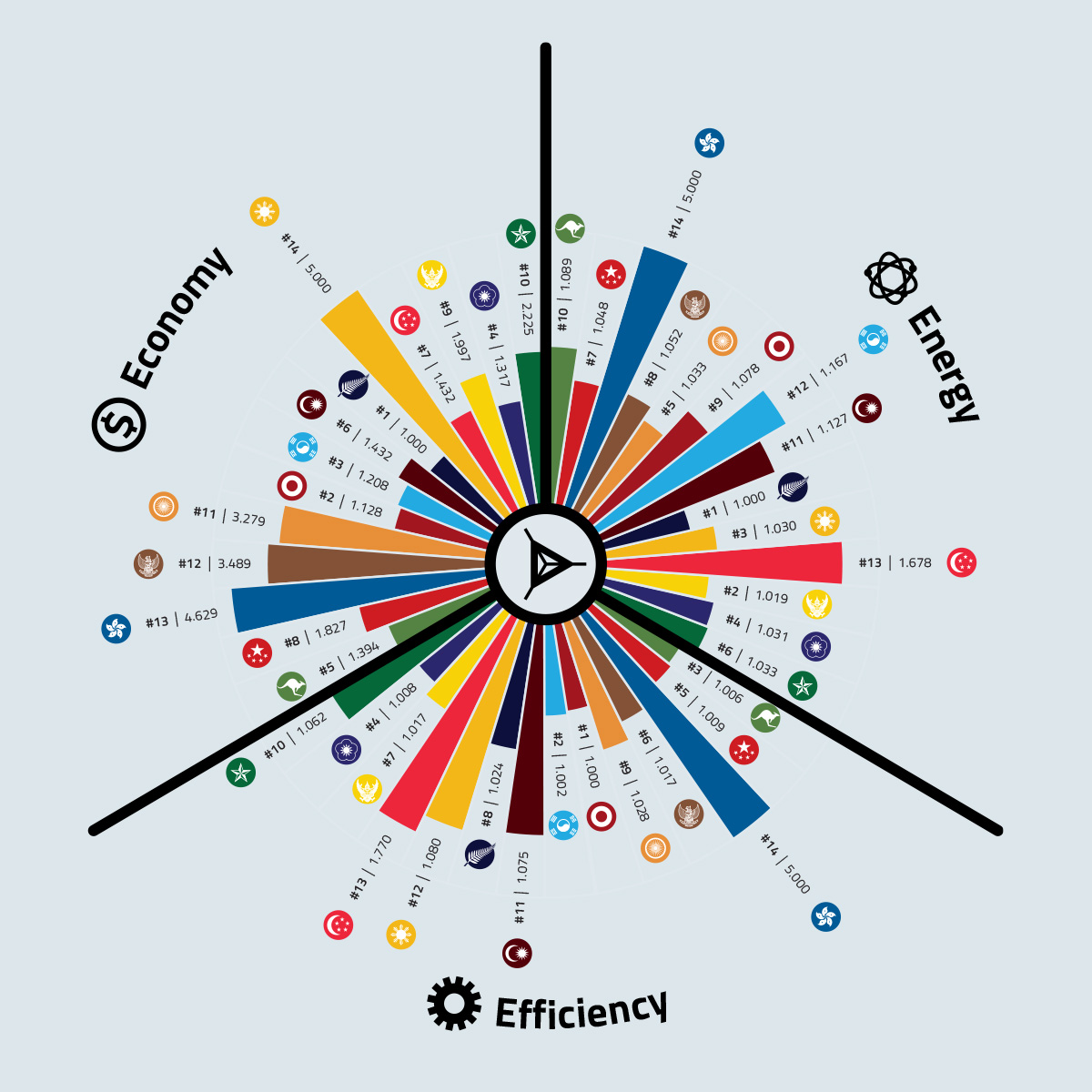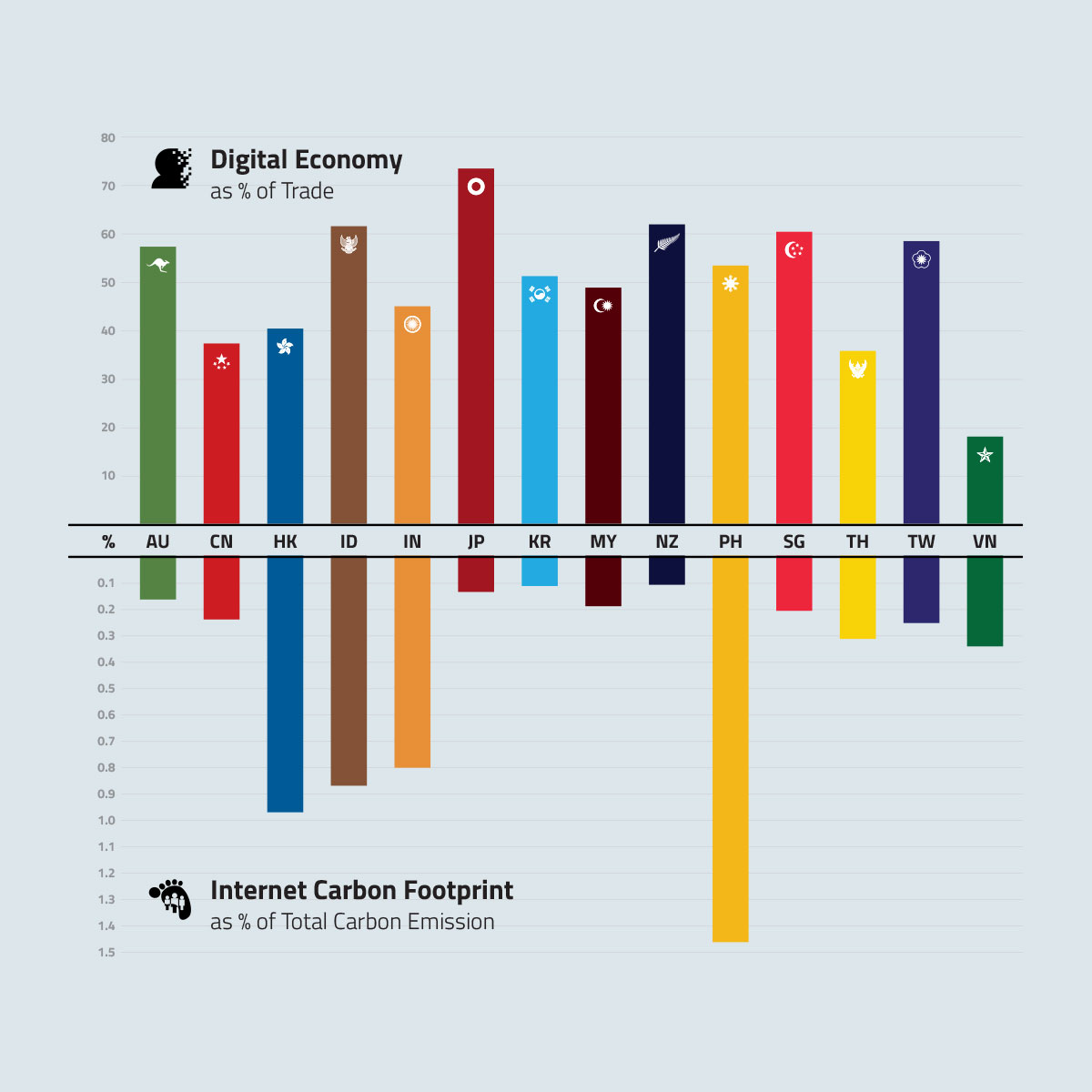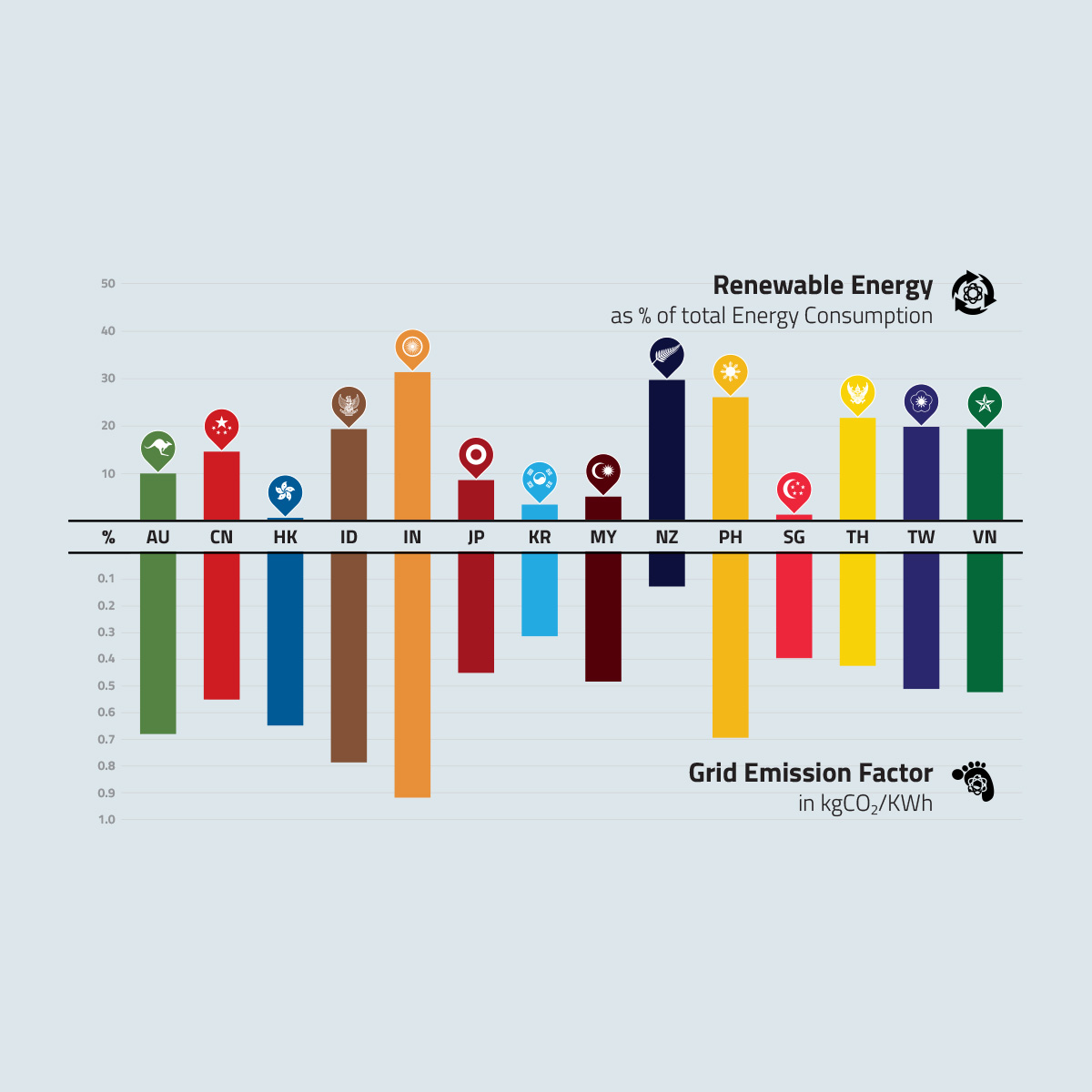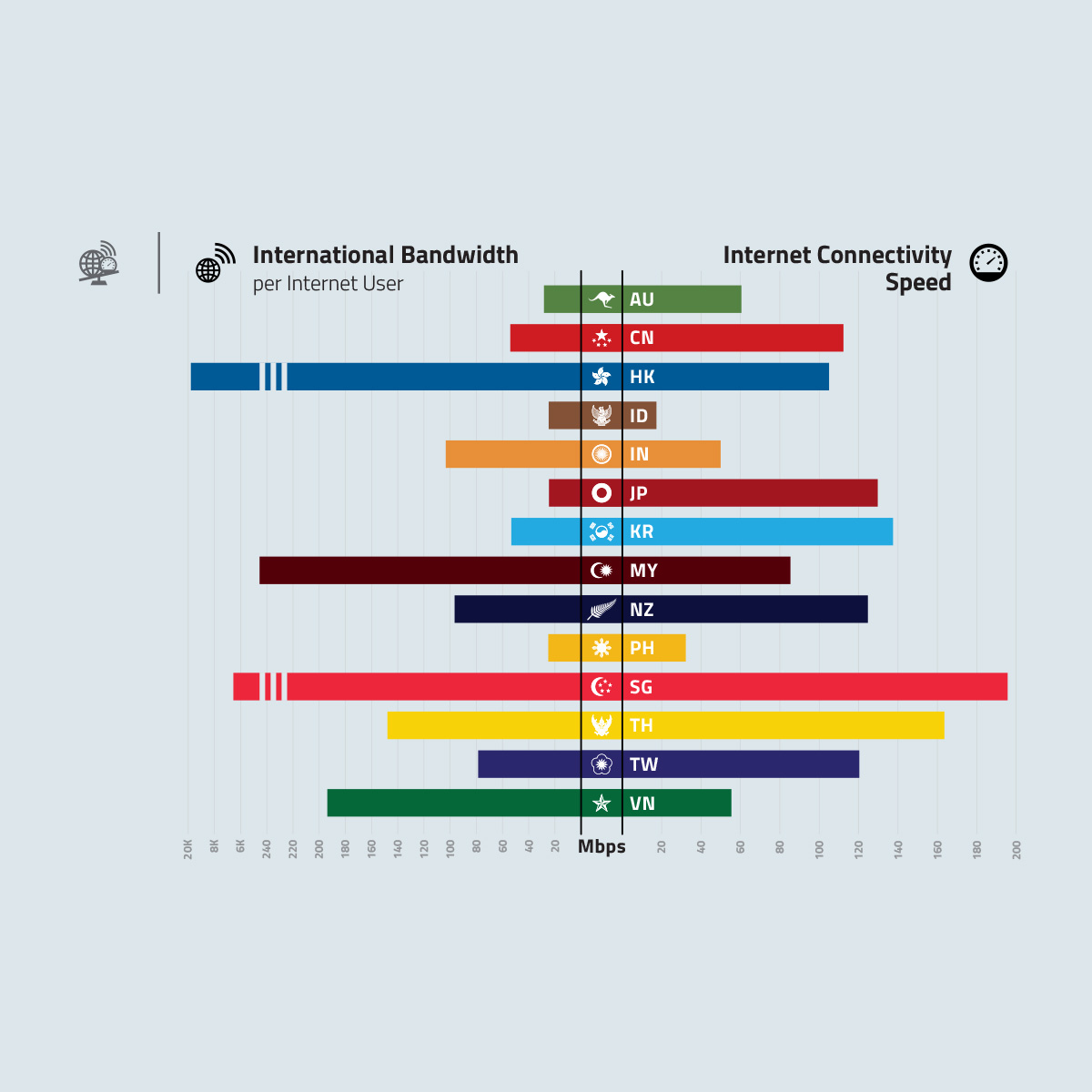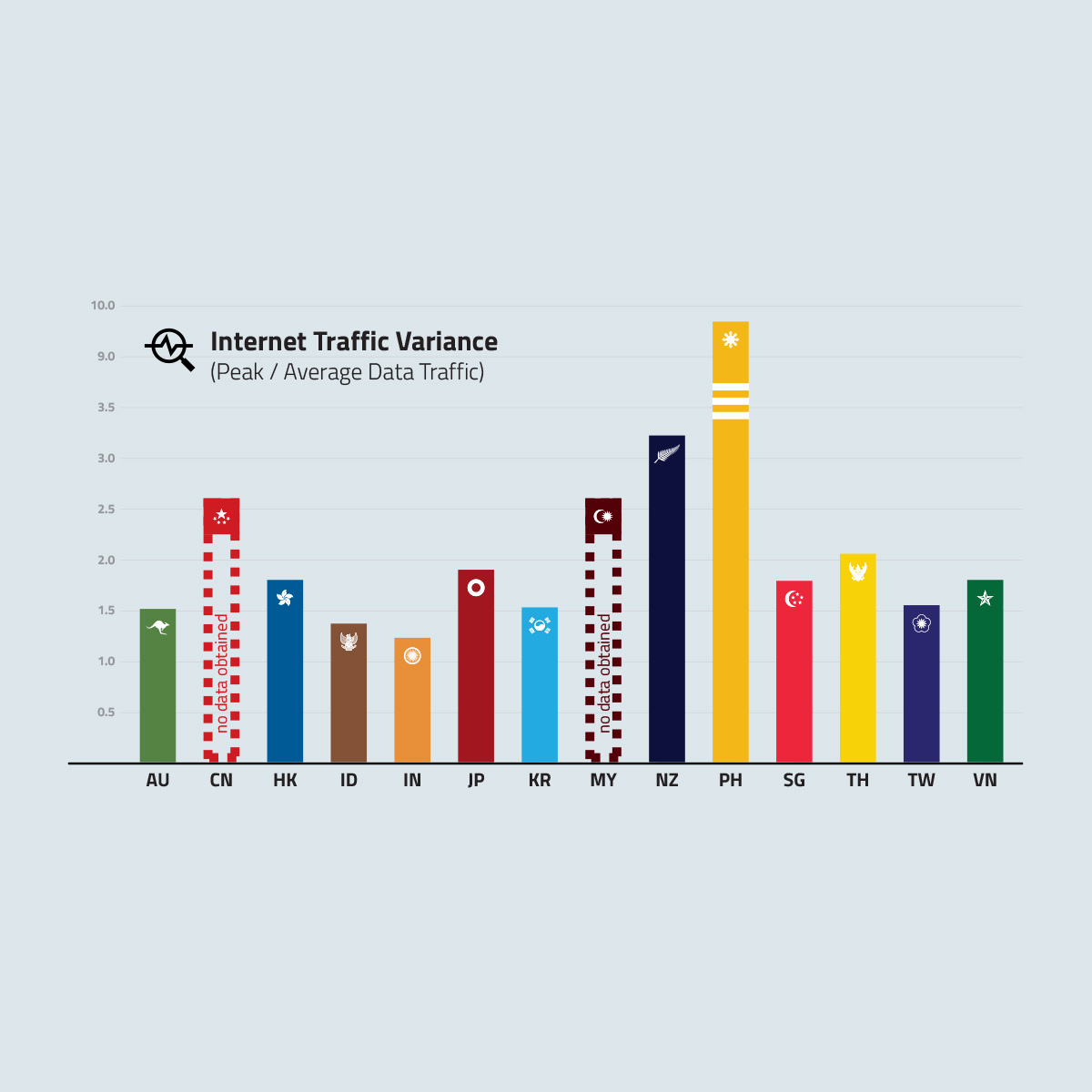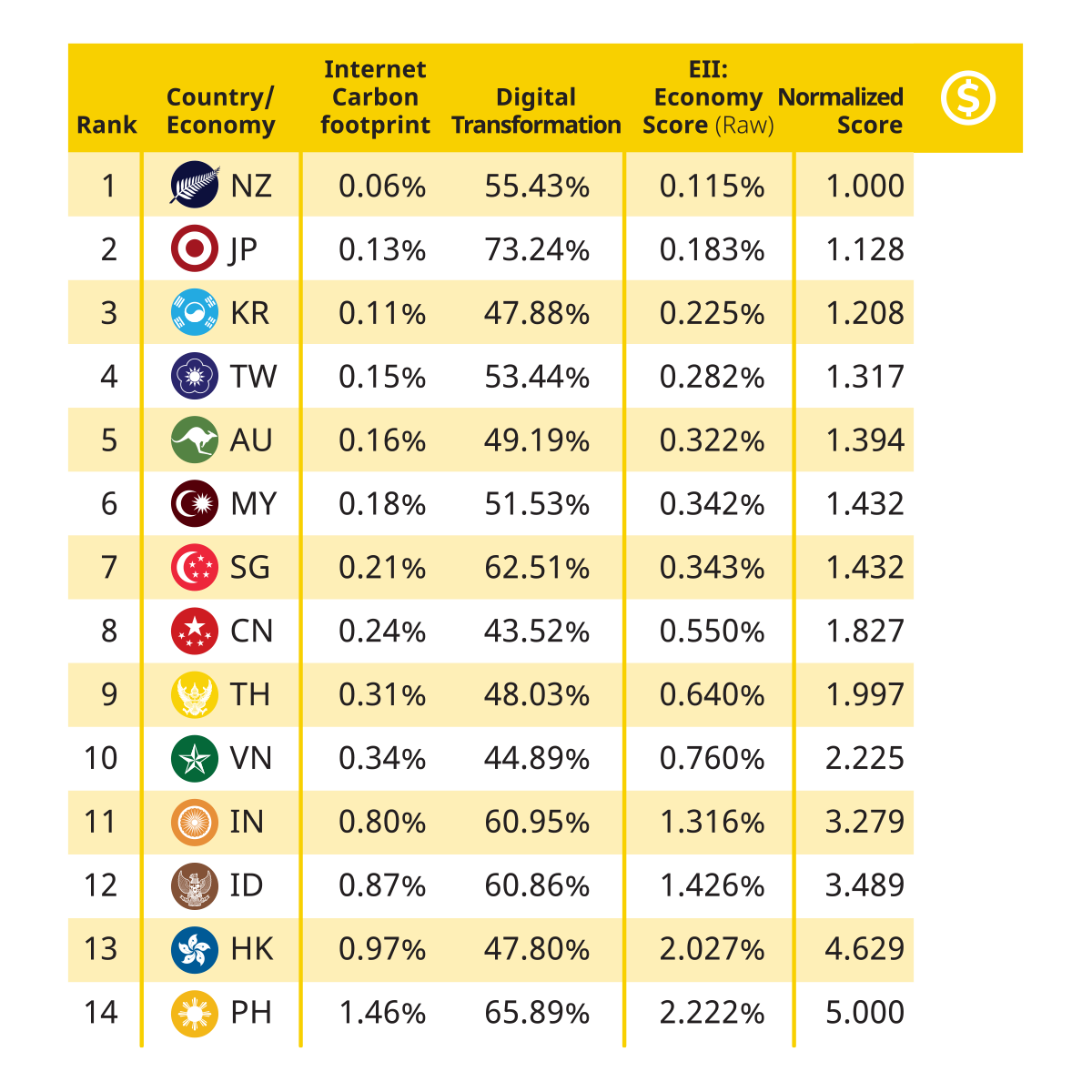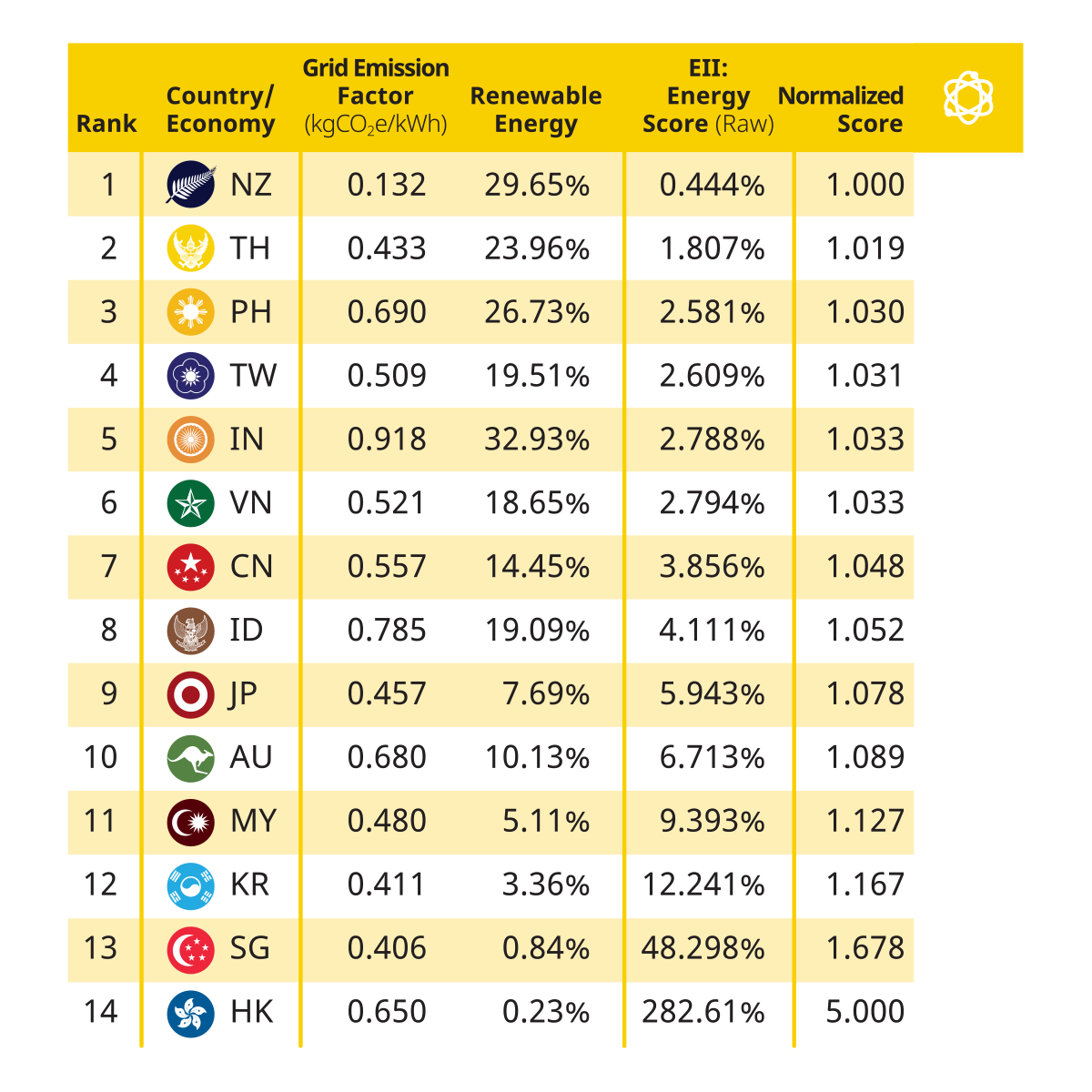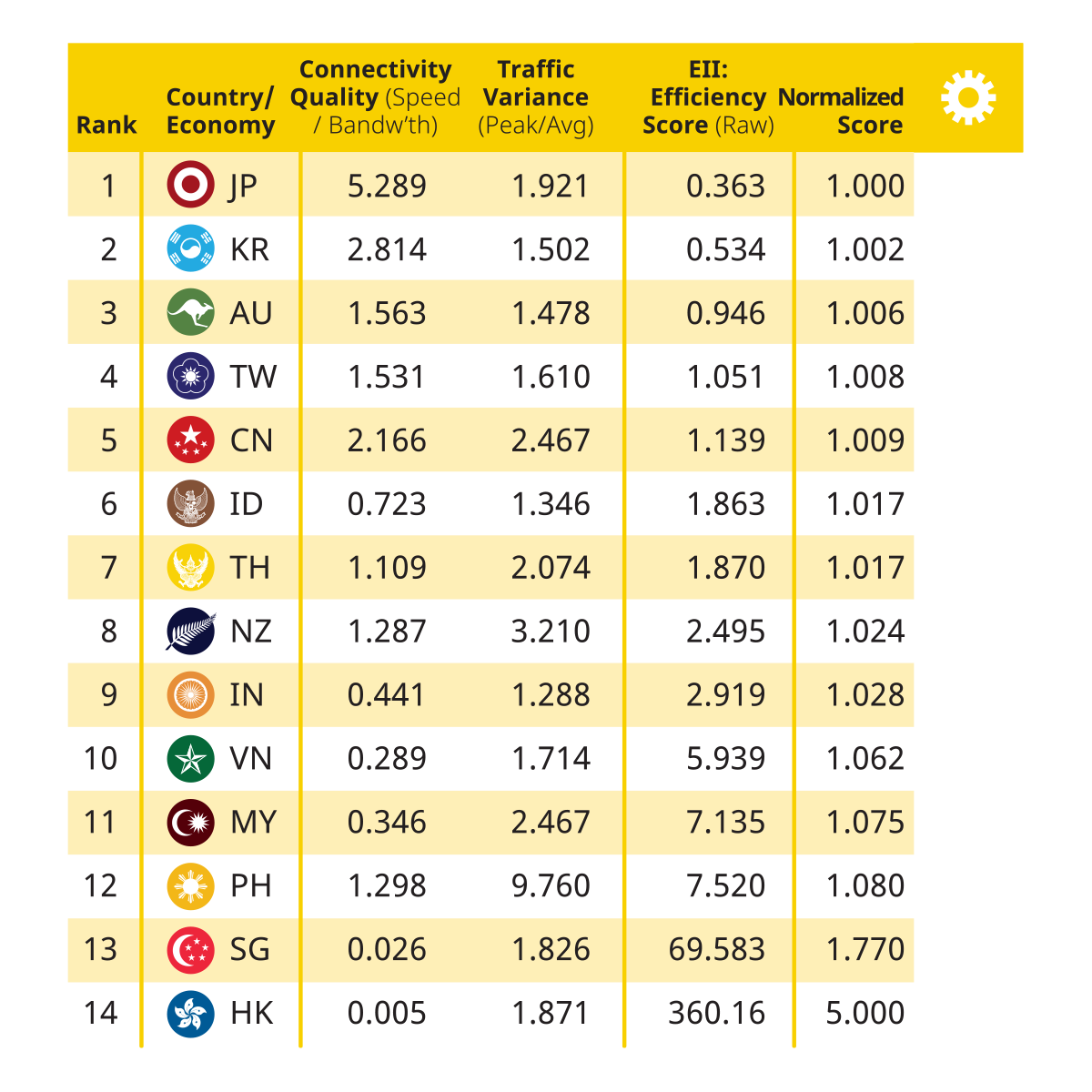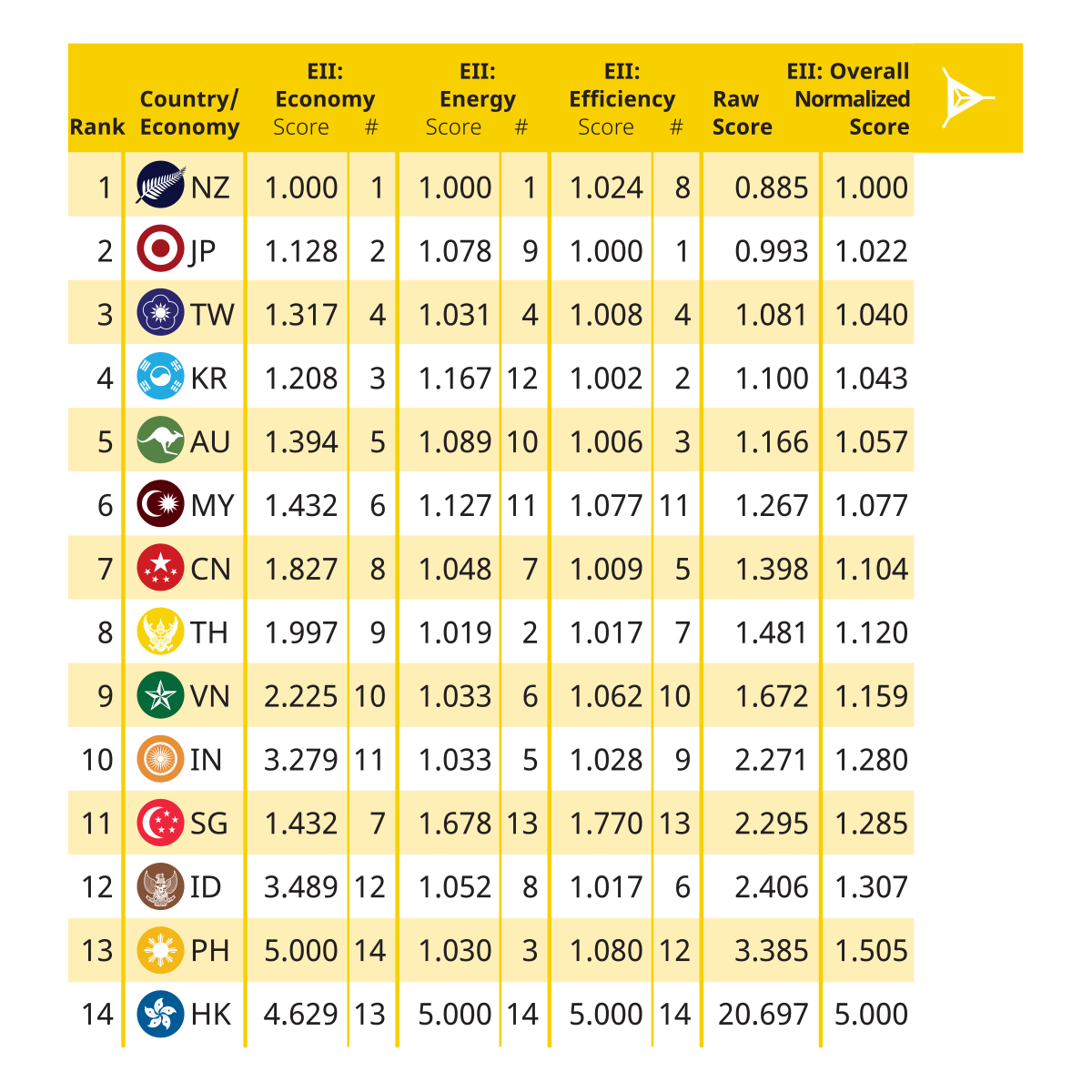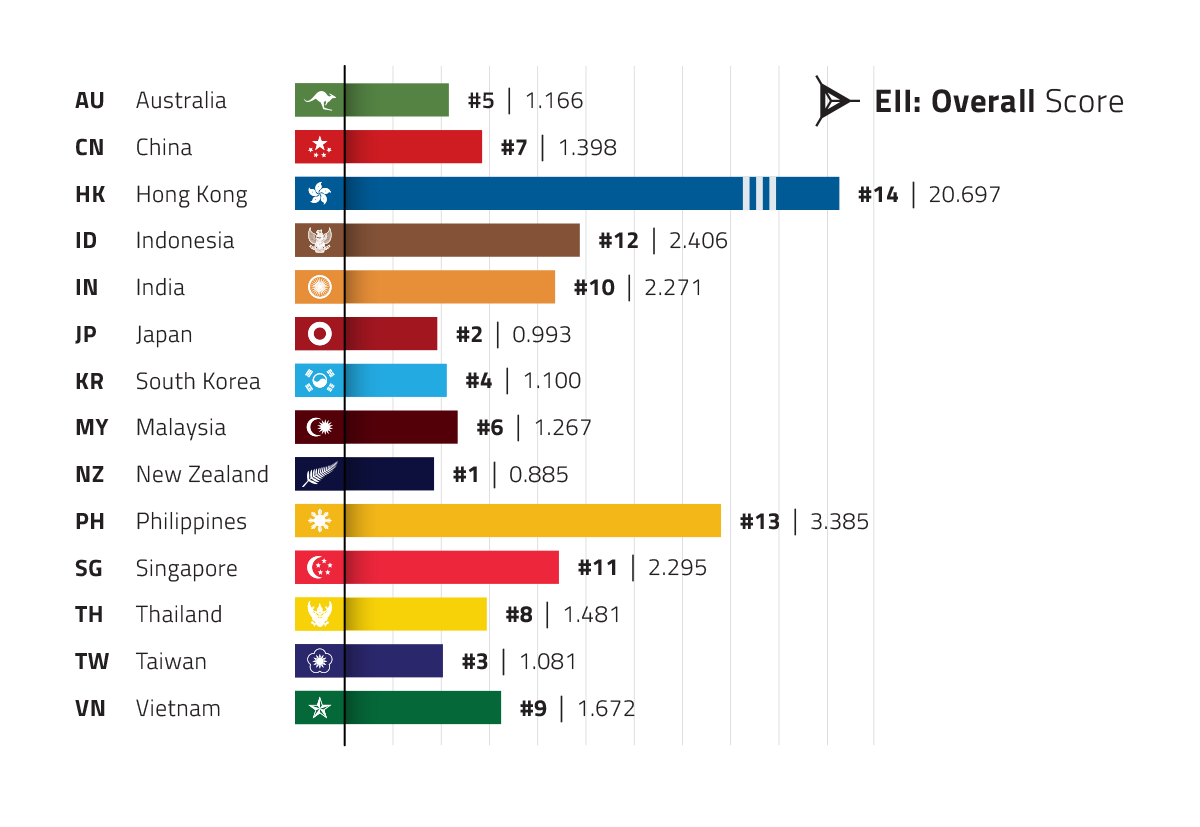
Measuring the Eco-Friendliness of Our Internet Infrastructure
EcoInternet Index | EII2023
Report & Rankings
EcoInternet Index Report & Rankings 2023

This page offers a sneak preview into EII 2003. Subscribe to receive the FREE full report & rankings.
Sustainability is now one of the top priorities in every global agenda across levels, from the industry level to individual level. As the awareness on sustainability rises, it has become one of the most important emerging topics within the Internet community. In recent years, the United Nations Internet Governance Forum (IGF) has started a Dynamic Coalition on Environment as an outcome of the Policy Network on Environment. Since 2022, sustainability is also included as one of the three thematic tracks of the Asia Pacific Regional Internet Governance Forum (APrIGF), but the topic is only slowly gathering attention in the region.
Asia is lagging behind when it comes to sustainability and carbon initiatives. According to a recent report, the predominant hurdle faced by member corporations in the RE1001 – a global initiative of over hundreds of businesses committed to 100% renewable electricity – is to sourcing greener energy due to high cost of renewables, shortcomings of corporate procurement options and prevailing scarcity of renewable resources as the common prevalent factors. Despite these challenges, RE100’s membership has spiked with the most significant yearly growth to date particularly in Asia Pacific. The number of members in Asia Pacific have grown from less than 10 in 2016 to 102. This is a testament to the growing appetite from businesses in the region to adopt 100% renewable electricity.
Given the multitude of factors and emerging trends, the EcoInternet Initiative aims to raise public awareness and stimulate multistakeholder discussions concerning the environmental impact of the ever-growing Internet. EII’s overarching objective is to spark conversation and action among different sectors, and to foster collaboration with an ultimate goal of promoting environmentally sustainable Internet infrastructure in Asia Pacific and around the world. Building upon the foundation laid by the EII Pilot Study in 2021, the EII 2023 Rankings represent a breakthrough.
 At IGF2023, Kyoto I’ve had the pleasure of meeting many super friendly friends! Together, we all contributed to the development of a better internet!
At IGF2023, Kyoto I’ve had the pleasure of meeting many super friendly friends! Together, we all contributed to the development of a better internet!
My team and I at DotAsia Organisation presented the groundbreaking EcoInternet Index Report. Learn about the environmental footprint of the Internet and explore innovative ways to reduce it. Our report delves into sustainable practices for businesses, individuals, and policymakers.
The EcoInternet Index (EII) Framework
In the 2021 pilot study, one of the primary objectives was to develop a methodology that could offer a meaningful indicator for comparing the eco-friendliness of the Internet infrastructure across different jurisdictions. The EII framework was designed and built around three axes: Economy, Energy, and Efficiency. Each of the axes highlights the relationship between the positive aspects of the growth of the Internet and negative impacts of the Internet’s carbon footprint. Together it helps us better understand the impact of the Internet infrastructure on climate change. This philosophy seamlessly aligns with the overarching narrative of the EcoInternet Initiative: “Do more, waste less”.
Policy interventions are important for an EcoInternet, but involvement of multiple stakeholders from a wide spectrum is critical to the successful implementation of such regulation and incentives.
It is developed based on refinements made to using the EII Methodology in response to the findings in the EII Pilot Study 2021. The EII 2023 study encompasses 14 jurisdictions varying across the spectrum of population densities, terrains and levels of development.
The findings of the EII 2023 study affirms that the established EII framework offers a reasonable depiction and representation of the eco-friendliness of Internet infrastructure and usage patterns in specific jurisdictions. Additionally, EII 2023 serves as a comparative analysis between different jurisdictions. It is essential to clarify that the rankings are not intended to provide an absolute measurement of the carbon footprint of the Internet infrastructure in a particular jurisdiction. Rather, they offer a relative indication.
The final results reveal three general clusters:
- Leading territories:
New Zealand (#1), Japan (#2), Taiwan (#3) and Korea (#4); - Developing territories:
Australia (#5), Malaysia (#6), China (#7), Thailand (#8) and Vietnam (#9); and, - Trailing territories:
India (#10), Singapore (#11), Indonesia (#12) and the Philippines (#13); plus an outlier: Hong Kong (#14)
The findings of this study reveals that one of the frontrunners – New Zealand has a legacy of developing renewable sources of energy dating back to the 1800s, which laid a groundwork for climate change policies as early as in 2002. These policies have been developed over 20 years ago and have been continuously updated since. However, New Zealand’s Internet traffic pattern, such as online services and content, raises a concern due to its heavy reliance on the Australian infrastructure for which is still powered by coal.
Conversely, Japan demonstrates strong digital transformation and efficient localization of content and services that supports an eco-friendly Internet, despite only adapting a strong commitment towards cleaner energy sources only in recent years. The early results of Japan’s endeavors towards a greener Internet are promising, yet whether it is sustainable for the long run is still questionable.
At the lower end of the rankings, we found two “city-states” – Hong Kong and Singapore, that often regarded as highly developed economies are relatively slow to make commitments to renewable energy and comprehensive climate change policies. Nevertheless, both are poised to initiate a turnaround, pleding significant reductions in carbon emission over the next decade. If timely actions are taken, there is potential for notable improvements in their EII rankings as a result.
Expanding upon the narrative of “Do More, Waste Less”, as initially presented in the EII Pilot Study, and drawing from the insights gleaned from the EII 2023 findings, as well as early feedback from the community and governments alongside additional analysis, three pillars of engagement are formulated to guide and bolster future outreach and advocacy efforts:
- Digital Inclusion: sustainable and affordable energy establishes a foundation for digital inclusion, while localized content and services contributes to a more eco-friendly Internet infrastructure;
- Youth Engagement: Carbon-conscious users can drive change by adopting evolved work and lifestyles, alongside a shift in mindset conducive to innovation for sustainability; and,
- Multistakeholder Participation: Policy interventions are crucial for an EcoInternet, but involvement of stakeholders from a wide spectrum is critical to the success of implementation of such regulation and incentives.
EII’s Three Axes: Economy, Energy, Efficiency
The EII: Economy Axis takes into consideration the Internet usage patterns, relative carbon footprint of the Internet and the total carbon footprint of a country/economy, along with the relative size of the digital economy to the overall economy, as a composite indicator.
The EII: Efficiency Axis considers the connectivity quality (i.e. observed Internet speed) for users in relation to the International bandwidth supported by the Internet infrastructure in the country/economy, as well as the traffic variance (i.e. peak and average traffic levels), for a composite indicator to model the efficiency of the network as experienced by Internet users.
EII Axis Rankings
Score and ranking for the EII: Economy Axis among the locations studied in the EcoInternet Index (EII) 2023 Report:
In general, we can observe a relatively even distribution of scores spanning from 0.1 to 2 among the jurisdictions. An interesting revelation comes from Japan, where over 70% of services are categorized as digitally deliverable to the total trade in service,7 signifying a significant leap in digital transformation. The diagram on the bottom (page to the left) provides a perspective of the relative components of the EII: Economy axis and the respective scores amongst the jurisdictions included in the study. Another outlier observed is New Zealand’s (NZ) particularly low Internet carbon footprint when compared with other economies. This distinction propelled NZ to the top in the EII: Economy Axis ranking. Conversely, the Philippines has been pushed to the bottom due to its substantial carbon footprint.
Score and ranking for the EII: Energy Axis among the locations studied in the EcoInternet Index (EII) 2023 Report:
As briefly mentioned in the EII: Economy Axis discussion, New Zealand (NZ) stands out with an impressive 0.132 kgCO2e/kWh Grid Emission Factor, which is more than 3 times better than the next tier economies that falls into the 0.4 kgCO2e/kWh range, including Singapore, Korea, Thailand, Japan and Malaysia. The range of Grid Emission Factor is reasonably distributed between 0.4 to 0.6 kgCO2e/kWh, except for the outliers of NZ (0.132 kgCO2e/kWh) and India at 0.918 kgCO2e/kWh and Indonesia at 0.785 kgCO2e/kWh.
Score and ranking for the EII: Efficiency Axis among the locations studied in the EcoInternet Index (EII) 2023 Report:
It can be observed that the Connectivity Quality score for Japan (JP), Korea (KR), and China (CN) are relatively high, boosting their rankings in the EII: Efficiency Axis. This measure looks at the ratio between the International Bandwidth Capacity per Internet user in a jurisdiction as compared to the observed Internet speed for users. The results indicate that much of JP, KR and CN is the Internet traffic remains local and they do not require as much International Bandwidth, while Internet speed as experienced users remain comparatively high. This makes sense in that Internet content and services in these countries tend to rely more on local providers rather than international ones. Whereas in Indonesia, Malaysia, India and Vietnam perhaps the opposite is observed, with Australia, New Zealand, Taiwan, Thailand and the Philippines somewhere in the middle. In some ways, this may echo with “buying local” concepts, however, note that the EII: Economy axis balances this by considering growth in international digital trade as a positive factor. The Internet as a global open network that encourages the exchange of ideas worldwide remains an important foundation.
Overall score and ranking for the EII 2023:
Based on the results, there appears to be generally 3 clusters: 1. Advanced: NZ, JP, TW and KR; 2. Developing: AU, MY, CN, TH and VN; 3. Trailing: IN, SG, ID and PH; and, HK as an outlier. As mentioned earlier in the report, it is essential to reiterate that the intent of the EII Rankings is not to establish absolute comparisons but rather relative assessment on conditions of the eco-friendliness of the Internet infrastructure across different countries and economies in Asia Pacific. The general findings appear to substantiate the classification of the countries/economies studied in EII 2023 into 3 distinct groups. The more advanced cluster suggests that policy directives are making positive impact on the eco-friendliness of the Internet infrastructure in the country/economy, whereas the developing and trailing clusters indicate a relatively slower adoption of policy directives aimed at promoting a more sustainable energy grid and Internet. Surprisingly, SG and HK appears to be trailing behind in this regard. To gain further insights into this observations, please refer to the analysis included in section 3.3.
The EcoInternet Initiative (EII) is relevant to many of the Sustainable Development Goals (SDGs), especially Goal 7: Affordable & Clean Energy, as well as Goals 9 & 13 on Infrastructure and Climate Action. Other related goals include 1, 8, 12 and 17, in particular Targets: 1.5 & 1.4 on rights to basic services; 8.2 to achieve productivity though technological innovation; 12.6, 12.8 & 12.a to encourage corporations to adopt sustainable practices and promote a sustainable lifestyle; as well as 17.6 &17.17 to enhance partnerships between multiple stakeholders.
Hope you enjoyed this report! Did you miss the 2021 EII Pilot Study?
About Ajitora
Get Involved
Social Feed & News
Contact Us
Mailing Address:
12/F Daily House,
35-37 Haiphong Road
Tsim Sha Tsui, Hong Kong
Media Contact: ajitora@dot.asia
Book Ajitora: ajitora@dot.asia
General Inquiries: info@ajitora.asia
Email Ajitora: me@ajitora.asia

